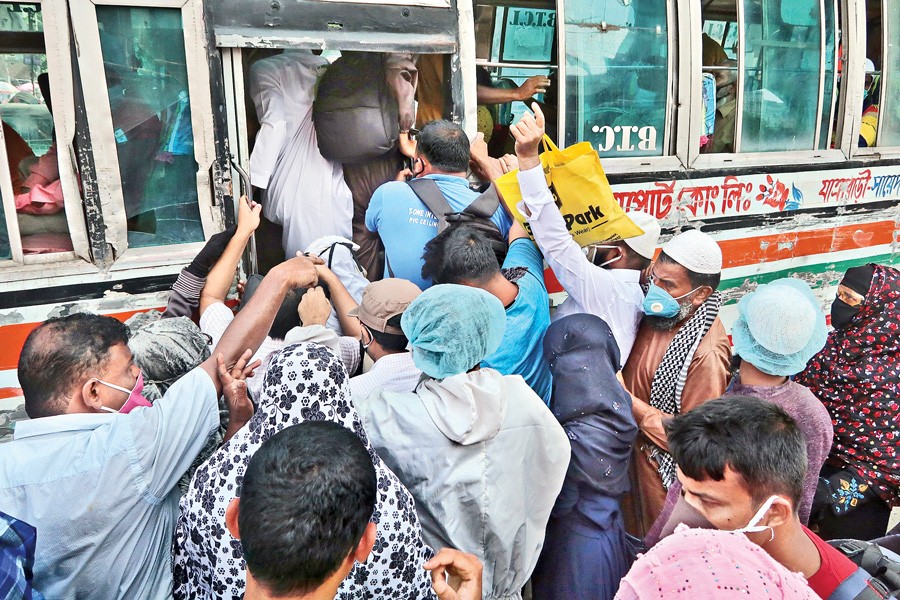
Published :
Updated :

Nilachol, Moumita, Number 13, Midline—these names often evoke butterflies in our stomachs, illustrating that this might be a sophisticated Dhaka city aircraft. Well, these are the few elegant names of Dhaka's local buses, which are not as sophisticated as they sound.
Traffic and local buses are much like brothers from different mothers sharing a toxic relationship. Along with the Battle of Surviving in Dhaka, another battle you must face as a city resident is ensuring a seat on this local bus.
The population of this city is very high compared to its area, and not all the people are elite enough to afford personal transport or use Pathao and Uber. They have to put themselves on thin ice, the local bus. Most citizens of Dhaka city use the local bus as it is less costly.
Nobody can predict the traffic in Dhaka. It is like a thriller movie; you don’t know what might surprise you. A distance of four minutes might take forty to reach your destination. This is why the ultimate battle starts here in the early morning, just to ensure a seat at a low cost. From children to the elderly, everyone participates.
Kayes Azam, a final-year student of International Relations at Dhaka University, has come up with some valid and concerning issues while sharing his views with this writer. He stated that finding a bus after classes is one of the hardest things he has to deal with as a student because, most of the time, there aren't any seats available, forcing him to stand all the time. Eventually, after returning home, he has no energy left to study.
Mohaiminul Islam, an employee at an NGO, made a very similar claim. He said he lacks desire for work after finishing his office hours in Mohakhali and sometimes having to catch a bus for Azimpur that takes more than two hours.
People travelling by public transport are going through hardships that impact their physical and emotional well-being and, once again, are cutting down on their productive activities. Because of this, they are not prepared to fight in this war the very next morning. This is a common scenario for everyone who uses a local bus.
In addition, the struggles faced by women are even worse. Local buses carry more passengers than they can accommodate, forcing them to share the same floors and sometimes dealing with inappropriate behaviours. Despite this, they cannot speak out due to the chaos of other passengers. Even when they do, individuals are too tired to properly respond because they are too tired to fight this battle.
When discussing the condition of local buses, it becomes evident that the conditions in which these buses operate are deplorable, surpassing one's worst imaginable expectations. Let's speak about the seats; they are often broken, and sometimes there is nothing to do except stand, let alone fans. It is possible to see that some fans may be functioning while others may not. Passengers are often subjected to intense heat.
When embarking on a trip, it is often observed that passengers tend to choose the window seat. However, the appearance of the windows on our local buses presents a distinct contrast. Approximately half of the windows are seen to be either damaged or useless, exacerbating suffering on a rainy day.
Once again, if fortune does not favour you, you can find yourself having your phone stolen by someone else while you admire the view of the outside world via the windows or prepare to snap a picture. It is not unexpected if you discover anything taken, but you still need to check your pockets since local buses are known for being pick-pocketed.
Local buses are partly at fault for the traffic bottleneck and noise. They deliberately pick up extra people and halt randomly at every station, killing the time. The overcrowding poses a safety risk for elderly people.
But if we ignore the other side of the issue and assign all the responsibility to one side, that would be incorrect.
Sometimes, the passengers are adamant about getting aboard, and if the bus conductor refuses, they face verbally neglectful remarks. Additionally, they face extortion and other issues from different groups, including the bus owners. As a result, they can't help taking more passengers.
Each of us has a tale of hardship, yet we continue in the busiest metropolis with our bitter-sweet experiences of daily commute by public transport.
mdimran-2020512459@ir.du.ac.bd


 For all latest news, follow The Financial Express Google News channel.
For all latest news, follow The Financial Express Google News channel.